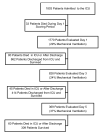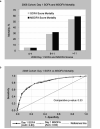A modified sequential organ failure assessment score for critical care triage
- PMID: 21149228
- PMCID: PMC3811929
- DOI: 10.1001/dmp.2010.40
A modified sequential organ failure assessment score for critical care triage
Abstract
Objective: The Sequential Organ Failure Assessment (SOFA) score has been recommended for triage during a mass influx of critically ill patients, but it requires laboratory measurement of 4 parameters, which may be impractical with constrained resources. We hypothesized that a modified SOFA (MSOFA) score that requires only 1 laboratory measurement would predict patient outcome as effectively as the SOFA score.
Methods: After a retrospective derivation in a prospective observational study in a 24-bed medical, surgical, and trauma intensive care unit, we determined serial SOFA and MSOFA scores on all patients admitted during the 2008 calendar year and compared the ability to predict mortality and the need for mechanical ventilation.
Results: A total of 1770 patients (56% male patients) with a 30-day mortality of 10.5% were included in the study. Day 1 SOFA and MSOFA scores performed equally well at predicting mortality with an area under the receiver operating curve (AUC) of 0.83 (95% confidence interval 0.81-.85) and 0.84 (95% confidence interval 0.82-.85), respectively (P = .33 for comparison). Day 3 SOFA and MSOFA predicted mortality for the 828 patients remaining in the intensive care unit with an AUC of 0.78 and 0.79, respectively. Day 5 scores performed less well at predicting mortality. Day 1 SOFA and MSOFA predicted the need for mechanical ventilation on day 3, with an AUC of 0.83 and 0.82, respectively. Mortality for the highest category of SOFA and MSOFA score (>11 points) was 53% and 58%, respectively.
Conclusions: The MSOFA predicts mortality as well as the SOFA and is easier to implement in resource-constrained settings, but using either score as a triage tool would exclude many patients who would otherwise survive.
Figures


Comment in
-
MSOFA: An important step forward, but are we spending too much time on the SOFA?Disaster Med Public Health Prep. 2010 Dec;4(4):270-2. doi: 10.1001/dmp.2010.41. Disaster Med Public Health Prep. 2010. PMID: 21149226 No abstract available.
-
Use of MSOFA for triage of disaster patients.Disaster Med Public Health Prep. 2011 Jun;5(2):97. doi: 10.1001/dmp.2011.32. Disaster Med Public Health Prep. 2011. PMID: 21685302 No abstract available.
References
-
- Ferreira FL, Bota DP, et al. Serial evaluation of the SOFA score to predict outcome in critically ill patients. JAMA. 2001;286:1754–1758. - PubMed
-
- Vincent JL, Moreno R, Takala J, et al. The SOFA (Sepsis-related Organ Failure Assessment) score to describe organ dysfunction/failure. On behalf of the Working Group on Sepsis-Related Problems of the European Society of Intensive Care Medicine. Intensive Care Med. 1996;22:707–710. - PubMed
-
- Cabre L, Mancebo J, et al. Multicenter study of the multiple organ dysfunction syndrome in intensive care units: the usefulness of Sequential Organ Failure Assessment scores in decision making. Intensive Care Med. 2005;31:927–933. - PubMed
-
- Hick JL. O'Laughlin DT. Concept of operations for triage of mechanical ventilation in an epidemic. Acad Emerg Med. 2006;13:223–229. - PubMed
Publication types
MeSH terms
Grants and funding
LinkOut - more resources
Full Text Sources
Other Literature Sources
Medical

